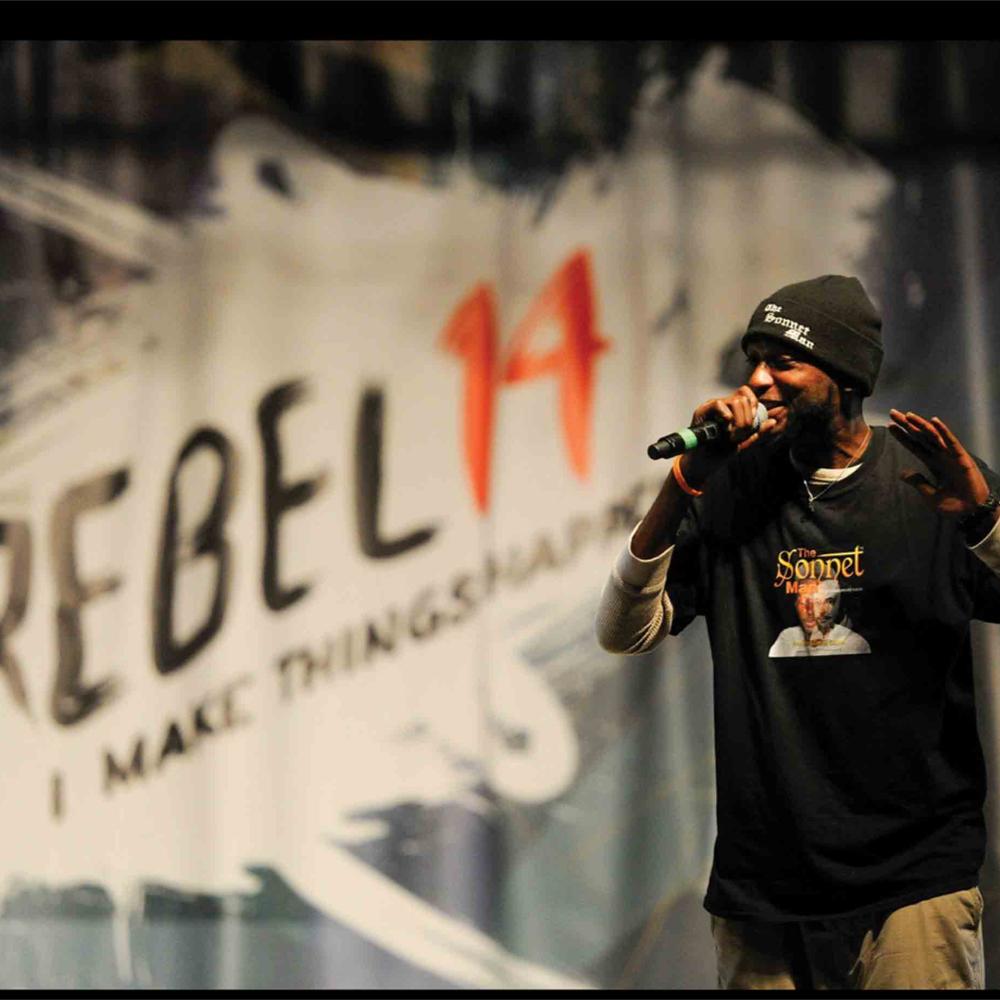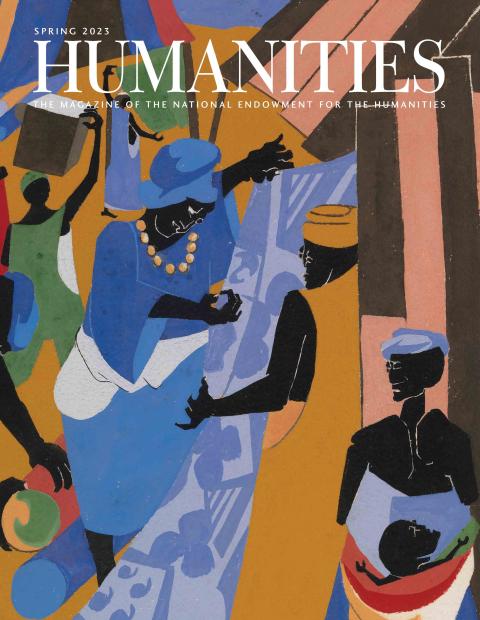Brooklyn-reared Devon Glover has turned his fascination with the rhythms of hip-hop and Shakespeare into a career as The Sonnet Man. The artist adapts Shakespeare’s text through his own original hip-hop lyrics. His spoken, sometimes improvised, riffs replace Elizabethan English with modern urban vernacular for student audiences. His niche as an African American rapper-cum-ambassador for Shakespeare represents the very inclusivity he hopes to bring to classical theater.
Glover didn’t always love the Bard. His first exposure came in high school. Despite being an honors English student who cracked books outside of class, he found that Shakespeare’s words and meanings withered and died on the page for him.
His first epiphany about the synergies between Shakespeare and hip-hop came while seeing the 2001 movie O, which resets Othello in a modern prep school and uses a blend of classical and contemporary music. That’s when he realized Shakespeare was meant to be heard and seen. Speaking the text and sonnets aloud, the verse’s beats and cadences came to life, remindful of rap’s rhythmic energy and urgency.
Reciting the Bard’s words himself, Glover discovered that themes from four centuries ago—love, betrayal, ambition, jealousy—infuse hip-hop lyrics. The human experience, he learned, hasn’t changed from Elizabethan times to now, from Old World Europe to Brooklyn, New York.
There’s a reason, he says, why Shakespeare is “the most adapted writer of all time.”
A math educator by training, Glover appreciates the precise, metered iambic pentameter prevalent in Shakespeare and Jay-Z. Once he unlocked this connection, he began translating it by creating content for Flocabulary, a library of songs, videos, and activities for K–12 online learning, and developing The Sonnet Man, with help from his late manager and collaborator, Broadway producer Arje Shaw. In his role as disruptor, Glover delivers his translations of Shakespeare to schools and festivals.
Just as he needed context to make the content relevant and engaging, so do today’s students.
“With my work, my goal is to show how wonderful Shakespeare wrote in verse. And whether it rhymes or not, there’s a rhythm to it. Once you get over the language barrier, you realize his stories are very relatable and understandable.”
Shakespeare’s Sonnet 18 reads: “Shall I compare thee to a summer’s day / Thou art more lovely and more temperate / Rough winds do shake the darling buds of May / And summer’s lease hath all too short a date.”
Glover recites Shakespeare’s original words before updating them, putting them to a hip-hop rhythm: “You remind me of the summer in the middle of June / So nice, no clouds in the sky / It always seems like summer’s ended too soon / So my limited time, I wanna spend it with you.”
Glover’s job, he says, is “bridging the gap from the 1600s to 2023, from Stratford-upon-Avon to Utah or Nebraska,” referring to recent Sonnet Man stops. He maintains a busy touring schedule that takes him across America, to Europe, even Africa.
He points out that just as hip-hop uses slang, so did Shakespeare. Indeed. The Bard coined a word, “swagger,” now identified with hip-hop. The same way rappers are branded outlaws and targeted by censors, so was Shakespeare. Both speak to issues of social justice. Just as hip-hop has brought new meaning to terms such as fly, cap, and hood and popularized the acronym GOAT (greatest of all time), Shakespeare gifted us with phrases like “all the world’s a stage,” “tough love,” and “foregone conclusion.”
Referring to the old master, Glover says, “He could have been an emcee. I mean, poets are emcees. He wrote so much relatable material that can be connected to the world.”
Such an effort to meld two worlds could invite resistance.
“When I began doing this, I knew some Shakespeare purists were not familiar with hip-hop or did not like hip-hop or did not understand it. And I knew some hip-hop aficionados did not understand Shakespeare, could not connect with it. I’m trying to bring both worlds together.”
Every time Glover presents or performs, he brings something different. “It evolves with every creation, with the reception of students, with what’s affecting the planet.” For a January 5–7 Omaha appearance, made possible by a grant from Humanities Nebraska, he led two workshops and was part of the opening and closing ceremonies of the Nebraska State Thespian Festival. “Students were very welcoming and open to new ideas,” he says. More than 600 students and 60 teachers and chaperones experienced Glover’s “metaverse” in Omaha.
Glover believes that popular adaptations such as The Lion King (Hamlet), West Side Story (Romeo and Juliet), 10 Things I Hate About You (The Taming of the Shrew) offer teachable moments. All these entrees into Shakespeare, including his own hip-hop ones, “give audiences a better understanding and appreciation” of the words and the meaning behind the source material.
“The issue I notice with students scheduled to study Shakespeare is the connection. That’s the thing.”
Without an engaging way to frame Shakespeare’s work, he says, it gets lost in translation. “Yes, we’re from two different worlds, but just because we’re from two different worlds doesn’t mean we don’t encounter the same things. It’s just a matter of the language. Sometimes it’s just a matter of understanding the context of what he’s saying. That’s when the interest begins increasing.”
“What makes me more joyous than anything is when I get a response from a student who has begun writing. That means Shakespeare has inspired them like he has inspired me and other artists and authors. . . . It’s a great career to have because Shakespeare’s everywhere.”


